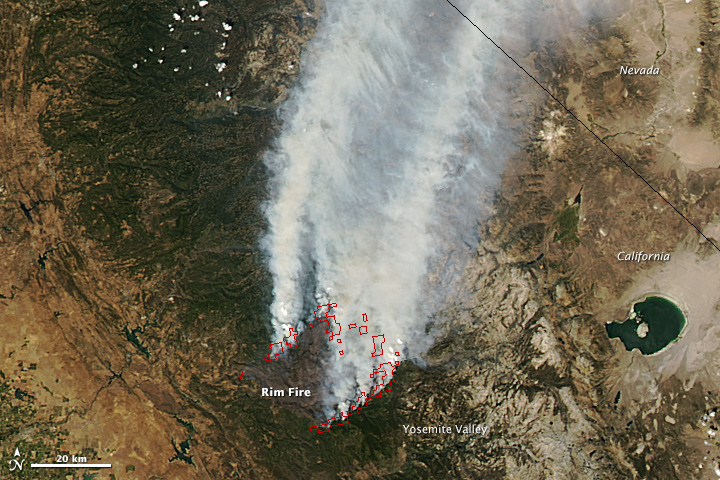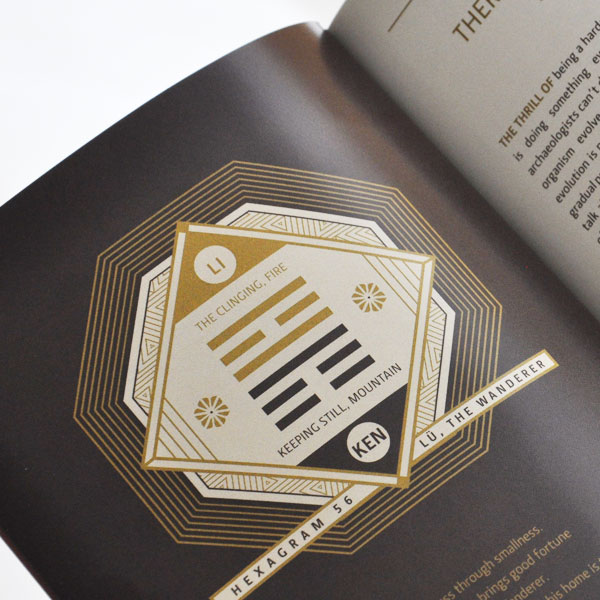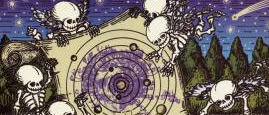By David Dodd
Here’s the plan—each week, I will blog about a different song, focusing, usually, on the lyrics, but also on some other aspects of the song, including its overall impact—a truly subjective thing. Therefore, the best part, I would hope, would not be anything in particular that I might have to say, but rather, the conversation that may happen via the comments over the course of time—and since all the posts will stay up, you can feel free to weigh in any time on any of the songs! With Grateful Dead lyrics, there’s always a new and different take on what they bring up for each listener, it seems. (I’ll consider requests for particular songs—just private message me!)
“There’s a dragon with matches that’s loose on the town...”

At a Ventura Fairgrounds show—I’ll have to look up the exact date—I remember the band opening with “Fire on the Mountain” as the hills blazed within sight of the crowd. This is one of those songs, akin to the many weather-oriented songs, that has, for good or ill, come in handy as a ready commentary on reality. (Mount Saint Helens erupted as the band played “Fire,” or so the legend goes. Were any of you there for that one?)
This is another of those songs with a long and complicated genesis story, perhaps not worth getting into too much detail about here, but the rough outlines at least are important to note. The lyrics, according to Robert Hunter in Box of Rain, were “Written at Mickey Hart's ranch in heated inspiration as the surrounding hills blazed and the fire approached the recording studio where we were working.”
Hart, credited with the music for the song, recorded a proto-rap version of the song for an unreleased album entitled Area Code 415, recorded in 1972 and 1973. It was also included on a Mickey Hart album entitled Fire on the Mountain, recorded in 1973-74. It appeared as an instrumental entitled “Happiness is Drumming” on Hart’s 1976 studio album, Diga. And it finally began showing up in the Grateful Dead repertoire, sung by Jerry Garcia, in 1977, undergoing a number of variants of the lyrics until it settled into the form that was eventually recorded and released on Shakedown Street, in November 1978. There’s a lot of other detail I haven’t mentioned—possibly worthy of some historian taking it apart piece by piece, but you get the rough idea.
On March 18, 1977 at Winterland Arena, San Francisco. "Fire" appeared for the first time, closing the first set, following its eternal partner, "Scarlet Begonias." This combination of tunes, which frequently enclosed some wonderful jamming, came to be known as "Scarlet Fire." There were a handful of occasions on which “Fire” appeared without “Scarlet Begonias,” but not many. I count 15 out of the total 253 performances. It remained steadily in the repertoire from then on, and was played for the final time on July 2, 1995, at the Deer Creek Music Center in Noblesville, Indiana.

The I Ching contains a hexagram, #56, titled variously “The Traveler,” “Travel,” “The Stranger,” and so on. It is represented by the two trigrams of fire and mountain, with fire resting on mountain. I have received quite a bit of mail over the years with convincing interpretations of how this applies or might apply to the Dead, or to the scene, or to world politics, or to the individual spiritual journey of the person writing the email, and truly, I think these are all valid ways of looking at the hexagram, in the context of “Fire on the Mountain.”
On the other hand, “Fire on the Mountain” is also a line from a nursery rhyme (a frequent source for many lines in Grateful Dead lyrics); a fiddle tune; the title of a book by Edward Abbey, and so on.
I will tell an embarrassing story on myself — definitely not the greatest story ever told.
The first time I heard this song was at Winterland in 1978. I spent most of the show up behind the band—one of my favorite places in Winterland. The song was completely new to me, and I wrote about the concert in an article published in my college newspaper, The Cal Aggie, at UC Davis, shortly after the show. In that review, I stated that the band played a new song, and I gave the title as I heard the refrain, which was… “Running on the Balance Beam.” Yes, that is what I heard: “Running, running on the balance beam…” Whew. Not sure at all where that came from. I will blame it on the bad acoustics, for want of a socially-acceptable way to place the blame. It stands as the most egregious mondegreen ever, without the redeeming quality of being close enough to resemble the misheard lyric. And it’s preserved for eternity, or as long as newsprint lasts, in the library at UC Davis, in their bound volumes of the estimable Cal Aggie.
The song is another in the long line of Grateful Dead cautionary tales — it’s fun to think of what all could be occurring in the song. Given Hunter’s explanatory note about the circumstances of writing the lyric, it could be seen as a pretty straightforward commentary on the bravery or foolishness of making music while a fire is coming at you. But, of course, Hunter re-contextualizes everything on the fly, and wham! — the song becomes something directed, uncannily, at each of us, or at us collectively: how come we’re doing the same old same old when disaster is at hand? Or, the song becomes directed, once again, as discussed in an earlier post about “Wharf Rat,” to Garcia by Hunter. “You gave all you had, why you want to give more?”
The song’s catchy rhythmic figure is a perfect foil for Garcia’s playful guitar work, as it winds in and out of the beats. The solos between the choruses might find Garcia screaming, dancing, or both simultaneously. And I suppose we were all doing the same, right along with him. And his delivery of the lyrics seemed pretty much deadly serious. The entire performance can seem like a prophet delivering some pretty dire news. And yet, we dance. And dance.
So, listen up — I think the band is trying to tell us something.
The Yosemite Rim Fire has me thinking about this song these days. Growing up in California, I have taken for granted that the high country is there for me, whenever I need to get re-charged with a strong dose of natural beauty and wonder.
dead comment
FOTM
I read that Jerry used "persian" which is not technically H
There is one miracle I wish would have been around in his time. Subutex. I think every company that produces opioids and every doctor that prescribes them should be required to also provide or produce Subutex or buprenorphine at either the same or cheaper price than other opioids. That saved my friend's life. He was the last person who you would have ever thought would get into drugs. I still remember the day I saw him clean again. He did not have to tell me he had gotten clean, he looked so much healthier and happier that I knew instantly. He said that medicine saved his life, and that he could never have made it to where he was without that medicine. I later read from a wikileaks file dump from a gov server of a certain country that they tried the treatment and were forced to stop by corruption. Their seized opioid profits had plummeted. That document also claimed that the mafias who produce the drugs, tali--- included, fund anti subutex studies and write anti subutex articles. The laws and the damage done to so many innocent people aren't enough to scare them but that little pill can. Another victory goes to SCIENCE!





There is one miracle I wish would have been around in his time. Subutex. I think every company that produces opioids and every doctor that prescribes them should be required to also provide or produce Subutex or buprenorphine at either the same or cheaper price than other opioids. That saved my friend's life. He was the last person who you would have ever thought would get into drugs. I still remember the day I saw him clean again. He did not have to tell me he had gotten clean, he looked so much healthier and happier that I knew instantly. He said that medicine saved his life, and that he could never have made it to where he was without that medicine. I later read from a wikileaks file dump from a gov server of a certain country that they tried the treatment and were forced to stop by corruption. Their seized opioid profits had plummeted. That document also claimed that the mafias who produce the drugs, tali--- included, fund anti subutex studies and write anti subutex articles. The laws and the damage done to so many innocent people aren't enough to scare them but that little pill can. Another victory goes to SCIENCE!